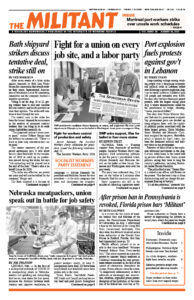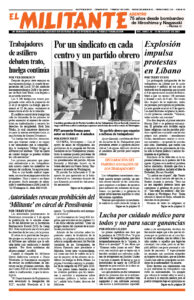In a victory for the rights of workers behind bars and freedom of the press, the Pennsylvania Department of Corrections on Aug. 3 overturned a ban on the Militant at the Camp Hill State Correctional Institution. Five days later, the Militant received notice from authorities at the Florida State Prison in Raiford, Florida, that they had impounded issue no. 30.
Florida officials pointed to an article in that issue headlined “Prisoners Demand Release from Overcrowded Jails.” The article reported on a peaceful protest by inmates’ family members in California demanding the state government release prisoners in the face of the spread of coronavirus throughout the system. Prison officials claim the article, “is dangerously inflammatory in that it advocates or encourages riot, insurrection, rebellion, organized prison protest, disruption of the institution, or the violation of the federal law, state law, or Department rules.”
Prison authorities in Florida have a history of impounding the Militant in recent years, which the paper has fought and overwhelmingly won on appeal. Florida is the state where the Militant has the largest subscription base among workers behind bars.
Overcrowding in California prisons has been widely reported in media across the country. In fact, in 2011 the U.S. Supreme Court ordered California to reduce its prison population by 33,000.
The Militant article also reports that 20 prisoners who have COVID-19 had announced they were going on a hunger strike to better the conditions they face.
One clause in the long list of reasons officials at the penitentiary point to for the impoundment is new. The impoundment form was revised in June, and for the first time includes the phrase “organized prison protest” as something that is “dangerously inflammatory.”
But there have been prisoner protests for decades, widely reported in the press. In fact, Florida authorities suppressed issues of the Militant that covered the hunger strike organized by California inmates in 2013 against brutal solitary confinement. On appeal the ban was overturned by the Department of Corrections Literature Review Committee. Other Militant news articles on prisoner protests that prison officials challenged have also been delivered to inmate subscribers after successful appeals.
Do they now think any coverage of a protest by prisoners — of any kind — has to be suppressed?
David Goldstein, the Militant’s attorney, contacted the Literature Review Committee and informed them the paper intends to appeal the impoundment. The committee in response said the impoundment is tentatively set for review on Aug. 13. If the committee doesn’t overturn it, the Militant can appeal.
“Inmates across the country, like workers everywhere, are deeply concerned about the way their living and work conditions affect the fact they might catch coronavirus,” Militant editor John Studer, said Aug. 11. “They seek control over those conditions to protect their health and safety.”
“We support these efforts and insist there is no reason they should be denied news reporting on this issue. Workers behind bars have the right to follow news and politics as they choose,” Studer said. “This is protected by the Constitution.”
Studer asked all those concerned about the rights of prisoners and of the press to join in urging the Literature Review Committee to overturn the impoundment.
Send your letter to Dean Peterson, Literature Review Committee, Florida Department of Corrections, 501 South Calhoun Street, Tallahassee, FL 32399 or via email at Allen.Peterson@fdc.myflorida.com, with a copy to the Militant.

